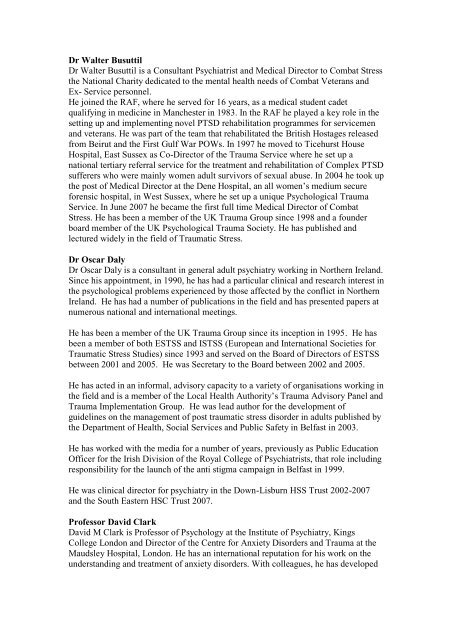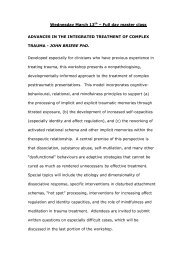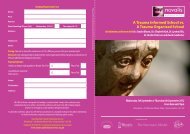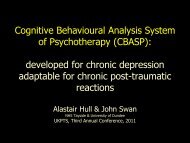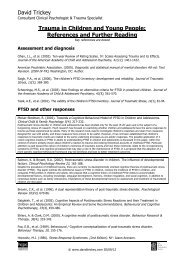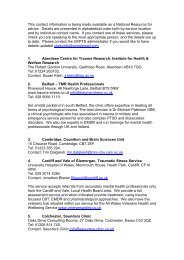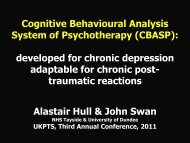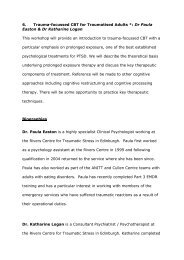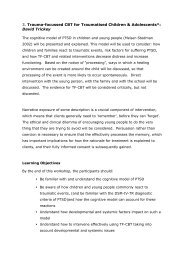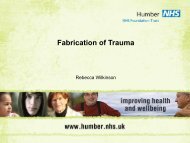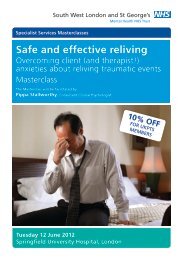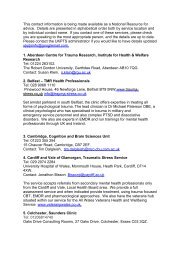Dr Jonathan Bisson - ukpts
Dr Jonathan Bisson - ukpts
Dr Jonathan Bisson - ukpts
You also want an ePaper? Increase the reach of your titles
YUMPU automatically turns print PDFs into web optimized ePapers that Google loves.
<strong>Dr</strong> Walter Busuttil<br />
<strong>Dr</strong> Walter Busuttil is a Consultant Psychiatrist and Medical Director to Combat Stress<br />
the National Charity dedicated to the mental health needs of Combat Veterans and<br />
Ex- Service personnel.<br />
He joined the RAF, where he served for 16 years, as a medical student cadet<br />
qualifying in medicine in Manchester in 1983. In the RAF he played a key role in the<br />
setting up and implementing novel PTSD rehabilitation programmes for servicemen<br />
and veterans. He was part of the team that rehabilitated the British Hostages released<br />
from Beirut and the First Gulf War POWs. In 1997 he moved to Ticehurst House<br />
Hospital, East Sussex as Co-Director of the Trauma Service where he set up a<br />
national tertiary referral service for the treatment and rehabilitation of Complex PTSD<br />
sufferers who were mainly women adult survivors of sexual abuse. In 2004 he took up<br />
the post of Medical Director at the Dene Hospital, an all women‟s medium secure<br />
forensic hospital, in West Sussex, where he set up a unique Psychological Trauma<br />
Service. In June 2007 he became the first full time Medical Director of Combat<br />
Stress. He has been a member of the UK Trauma Group since 1998 and a founder<br />
board member of the UK Psychological Trauma Society. He has published and<br />
lectured widely in the field of Traumatic Stress.<br />
<strong>Dr</strong> Oscar Daly<br />
<strong>Dr</strong> Oscar Daly is a consultant in general adult psychiatry working in Northern Ireland.<br />
Since his appointment, in 1990, he has had a particular clinical and research interest in<br />
the psychological problems experienced by those affected by the conflict in Northern<br />
Ireland. He has had a number of publications in the field and has presented papers at<br />
numerous national and international meetings.<br />
He has been a member of the UK Trauma Group since its inception in 1995. He has<br />
been a member of both ESTSS and ISTSS (European and International Societies for<br />
Traumatic Stress Studies) since 1993 and served on the Board of Directors of ESTSS<br />
between 2001 and 2005. He was Secretary to the Board between 2002 and 2005.<br />
He has acted in an informal, advisory capacity to a variety of organisations working in<br />
the field and is a member of the Local Health Authority‟s Trauma Advisory Panel and<br />
Trauma Implementation Group. He was lead author for the development of<br />
guidelines on the management of post traumatic stress disorder in adults published by<br />
the Department of Health, Social Services and Public Safety in Belfast in 2003.<br />
He has worked with the media for a number of years, previously as Public Education<br />
Officer for the Irish Division of the Royal College of Psychiatrists, that role including<br />
responsibility for the launch of the anti stigma campaign in Belfast in 1999.<br />
He was clinical director for psychiatry in the Down-Lisburn HSS Trust 2002-2007<br />
and the South Eastern HSC Trust 2007.<br />
Professor David Clark<br />
David M Clark is Professor of Psychology at the Institute of Psychiatry, Kings<br />
College London and Director of the Centre for Anxiety Disorders and Trauma at the<br />
Maudsley Hospital, London. He has an international reputation for his work on the<br />
understanding and treatment of anxiety disorders. With colleagues, he has developed
effective psychological treatments for four different anxiety disorders: panic disorder,<br />
social phobia, post-traumatic stress disorder and health anxiety.<br />
He has also played a key role in disseminating the new treatments. The first major<br />
project arose from the tragedy of the Omagh Car Bomb (15 th August 1998). Shortly<br />
afterwards, Professor Clark trained local clinicians in cognitive therapy for posttraumatic<br />
stress disorder. An audit of the initial cases demonstrated remarkable<br />
improvement and persuaded the Northern Ireland Office to help establish the<br />
Northern Ireland Centre for Trauma and Transformation which offers the treatment to<br />
victims of terrorist violence from 1970s onwards. The model adopted in Omagh was<br />
subsequently used as a template for the psychotherapeutic response to the 2005<br />
London Bombs, with similarly good results.<br />
He has been heavily involved in arguing for, and helping guide, the UK<br />
Government‟s Increasing Access to Psychological Therapies (IAPT) Initiative, which<br />
is a £306 million programme that aims to train and employ 3,600 new psychological<br />
therapists over the next three years. Professor Clark is currently the National Clinical<br />
Adviser to the Programme.<br />
Fellowships/Awards: He is a Fellow of the British Academy (London), a Fellow of<br />
the Academy of Medical Sciences (London), and Distinguished Founding Fellow of<br />
the Academy of Cognitive Therapy (USA). Also Past President of the British<br />
Association of Behavioural and Cognitive Psychotherapies (1992) and Past President<br />
of the International Association of Cognitive Psychotherapy (1992-95). Awards<br />
include: the May Davidson Award (British Psychological Society), the Research<br />
Excellence Award (Beck Institute for Cognitive Studies, USA), being voted a World<br />
Leader in Anxiety Disorders Research by members of the Anxiety Disorders of<br />
America Association (1998), and the Behaviour Research and Therapy Award (1997)<br />
for the most outstanding article ( “A Cognitive Approach to Panic”) published in that<br />
journal since it‟s founding in 1962.<br />
<strong>Dr</strong> Sarah Davidson<br />
Sarah is the Psychosocial Advisor for the British Red Cross. She has been with the<br />
Red Cross for over thirty years in a variety of roles including as an emergency<br />
responder, member of the Board of Trustees and Vice Chairman. As the Psychosocial<br />
Advisor she has developed the service the British Red Cross provides with the<br />
Foreign and Commonwealth Office responding to disasters involving British citizens<br />
around the world. She is also responsible for advising the Red Cross on all areas of<br />
psychosocial strategy and implementation, including emergency response and<br />
planning. She has written the Red Cross‟ psychosocial framework: CALMER and coauthored<br />
The First Aid Manual.<br />
Sarah is a Consultant Clinical Psychologist at the Tavistock Clinic in the NHS and<br />
Deputy Clinical Director of the Clinical Psychology Doctorate at the University of<br />
East London. She has over 20 years experience in the health service having initially<br />
qualified as a nurse, and has since been involved in all aspects of clinical practice,<br />
management, education and research.
<strong>Dr</strong> Chris Freeman<br />
<strong>Dr</strong> Freeman was appointed to the first Consultant Psychotherapist post in cognitive<br />
behavioural psychotherapy in 1984 and three years later opened the Cullen Centre the<br />
first cognitive behavioural psychotherapy department in Scotland specialising in the<br />
treatment of eating disorders, anxiety disorders and depression using CBT. He began<br />
regular training courses in CBT leading to the setting up of the South of Scotland<br />
Cognitive Behavioural Psychotherapy course.<br />
In 1996 <strong>Dr</strong> Freeman set up the Rivers Centre for the treatment of traumatic stress<br />
reactions. This was the first traumatic stress clinic in Scotland, named after William<br />
Halse Rivers who practiced in Craiglockhart during World War I. This is now called<br />
the Edinburgh Traumatic Stress Centre and has grown to the largest traumatic stress<br />
service in the UK.<br />
In 1996 he trained in interpersonal psychotherapy IPT in Toronto, Canada and then<br />
set up IPT UK the National organisation for the training and supervision of<br />
interpersonal psychotherapy. <strong>Dr</strong> Freeman continues his interest in ECT having set up<br />
SEAN the Scottish ECT Accreditation Network and ECTAS (the ECT accreditation<br />
service for England and Wales) under the auspices of the Royal College of<br />
Psychiatrists in 2002.<br />
In 2003 <strong>Dr</strong> Freeman started the ANITT (Anorexia Nervosa Intensive Treatment<br />
Team) which pioneered the use of intensive home based treatment for patients with<br />
severe anorexia nervosa who would normally be admitted to hospital.<br />
He has been editor of the Edinburgh Companion to Psychiatric Studies, published<br />
books on research methods, eating disorders and psychotherapy and over 200 peer<br />
reviewed research papers. He is currently chair of the Royal College of Psychiatrists<br />
Ethics Committee, has been chair of the UK Trauma Group for three years and is<br />
President of the inaugural board of the UK Psychological Trauma Society.<br />
<strong>Dr</strong> Adrian Grounds<br />
<strong>Dr</strong> Adrian Grounds is a University Senior Lecturer in Forensic Psychiatry at the<br />
Institute of Criminology, University of Cambridge, and Consultant Forensic<br />
Psychiatrist in the Cambridgeshire & Peterborough NHS Foundation Trust. In<br />
addition to research and teaching in the University he provides a community forensic<br />
psychiatry service in mid-Cambridgeshire and with the mental health in-reach team at<br />
Littlehey Prison. He is also one of the Sentence Review Commissioners and a Parole<br />
Commissioner in Northern Ireland and a Trustee of the Prison Reform Trust.<br />
<strong>Dr</strong> Jamie G H Hacker Hughes<br />
<strong>Dr</strong> Hacker Hughes is Head of Defence Clinical Psychology, Ministry of Defence and<br />
Honorary Senior Lecturer in Military Psychology at King‟s College London. He is a<br />
Consultant Chartered Clinical Psychologist, Clinical Neuropsychologist, Cognitive-<br />
Behavioural Psychotherapist and EMDR Consultant.<br />
Jamie has a particular interest in the psychological preparation of troops for military<br />
operations and in clinical interventions, especially early interventions, to minimise<br />
any psychological after-effects and has visited several operational theatres including<br />
Northern Ireland, Bosnia, Kosovo and Iraq. He has researched and published widely
in the areas of clinical hypnosis, cognitive behavioural therapy, PTSD, EMDR and<br />
psychological effects of military operations and is a reviewer for several journals.<br />
Jamie is a former Chair of the Eastern Counties Branch of BABCP and Council<br />
Member of the UK & Ireland EMDR Association and is currently on the Board of the<br />
UK Psychological Trauma Society and a member of the ESTSS Task Force on<br />
Managing Trauma in the Uniformed Services. He is Vice Chair of the NATO Task<br />
Group on Stress and Psychological Support in Modern Military Operations and<br />
represents NATO Psychologists on the NATO Military Psychiatry Panel. He is a coauthor<br />
of the recent NATO Joint Medical Committee and Senior Civil Emergency<br />
Planning Committee on Psychosocial Care for People affected by Disasters and Major<br />
Incidents.<br />
<strong>Dr</strong> Alastair Hull<br />
<strong>Dr</strong> Alastair Hull is a Consultant Psychiatrist in Psychotherapy and Clinical Lead for<br />
the Tayside Multidisciplinary Adult Psychotherapy Service (MAPS). He is an<br />
Honorary Senior Clinical Lecturer at the University of Dundee. Prior to Tayside he<br />
worked at the Traumatic Stress Clinic and trauma liaison service in Aberdeen and as<br />
an aspiring academic at the Aberdeen Centre for Trauma Research.<br />
His teaching and research interests mirror his clinical work with a noted<br />
preoccupation with post-trauma reactions evidenced by his publications. He has<br />
presented at National, European and World conferences on aspects of post-traumatic<br />
outcome and care and runs workshops on the treatment of post traumatic reactions<br />
and chronic depression.<br />
<strong>Dr</strong> Lesley Hunter<br />
Lesley is a chartered clinical psychologist who has worked in a variety of NHS<br />
settings including most recently, the Lothian Chronic Pain Service where she was<br />
responsible for the management and delivery of psychology services to the<br />
anaesthetist led pain clinic at the Western General Hospital Edinburgh. Previously,<br />
she was a management consultant with the Human Resources Team at KPMG,<br />
Edinburgh where she was involved in the provision of business psychology services<br />
to clients. Lesley joined the team at Edinburgh Traumatic Stress Centre in June 2003.<br />
Neil J Kitchiner<br />
Neil is a Behavioural & Cognitive Psychotherapist. He is currently seconded from the<br />
Cardiff and Vale ULHB, Dept of Liaison Psychiatry and Traumatic Stress Service, to<br />
facilitate the pilot MOD funded Veterans Community Mental Health Service. He is a<br />
registered mental health nurse with 24 year‟s experience of working in the UK and<br />
Australia. He has worked in HM Prisons, the Priory Hospital, Bristol and for the past<br />
7 years at the University Hospital of Wales, with responsibility for the NHS<br />
partnership with the South Wales Fire and Rescue Service. Neil is in his final year of<br />
a PhD at Cardiff University.<br />
<strong>Dr</strong> Deborah Lee<br />
Deborah is a Consultant Clinical Psychologist and Head of Berkshire Traumatic<br />
Stress Service. She is also an honorary Senior Lecturer at University College London.
<strong>Dr</strong> Lee has worked in the field of trauma for 16 years and specialises in the treatment<br />
of PTSD and complex Trauma. Her particular area of clinical and research interest is<br />
in shame based PTSD and self-criticism. She has developed the use of compassion<br />
based treatments including the use of compassionate imagery in shame based<br />
flashbacks to enhance clinical practice in this field. She has widely contributed to the<br />
dissemination of her clinical knowledge through writing and delivering clinical<br />
workshops. She has authored many papers and book chapters on this topic.<br />
<strong>Dr</strong> Joan Lovett<br />
Joan Lovett, MD, FAAP is a behavioural paediatrician who has been in private<br />
practice in Berkeley for the past 15 years. She is a Fellow of the American Academy<br />
of Paediatrics and an EMDRIA Approved Consultant.<br />
She is a graduate of Wellesley College, earned her medical degree at UCSF Medical<br />
School, completed internship and residency at Montreal Children‟s Hospital and was<br />
a Robert Wood Johnson Clinical Scholar at Stanford. <strong>Dr</strong>. Lovett is author of Small<br />
Wonders: Healing Childhood Trauma with EMDR. She has given many presentations<br />
on childhood trauma and attachment both nationally and internationally.<br />
Gill Moreton<br />
Gill began her professional career as a child and family social worker specialising in<br />
child protection. In 1996 she was involved in the immediate response to the shootings<br />
at Dunblane Primary School and in the establishment of the Support Centre where she<br />
worked for the next five years in the multidisciplinary team providing a practical and<br />
therapeutic service to those affected by the incident. Since then she has specialised in<br />
the treatment of children and adults affected by trauma, and is trained in CBT and<br />
EMDR. Previously, she was co-ordinator of a Child Sexual Abuse team within<br />
CAMHS in NHS Lothian and continues to supervise colleagues there. Gill joined the<br />
Rivers Centre for Traumatic Stress in June 2002 and is the lead clinician for work<br />
with the Emergency Services.<br />
<strong>Dr</strong> Michael C. Paterson OBE, PhD, DClinPsych, CPsychol, CSci, AFBPsS<br />
<strong>Dr</strong> Michael Paterson OBE is a Clinical Psychologist based in Belfast specialising in<br />
the treatment of multiply traumatised people.<br />
He was invited by <strong>Dr</strong> Francine Shapiro, the originator of EMDR, to train with her as<br />
an EMDR Institute Trainer. He joined the Institute‟s Faculty in 2006.<br />
Always an advocate for EMDR, Michael sat on CREST in 2003 (Northern Ireland)<br />
and played a key role in ensuring the recommendation of EMDR as an effective<br />
treatment for PTSD in adults; the guidance from CREST subsequently fed into the<br />
NICE (2005) deliberations.<br />
Michael has authored a chapter in Healing the Heart of Trauma and Dissociation with<br />
EMDR and Ego State Therapy and presented workshops on the subject.<br />
<strong>Dr</strong> Paterson arranges trainings in EMDR in the United Kingdom and Ireland and,<br />
more recently, delivered a Part 1 training to mental health professionals in Bosnia and<br />
Herzegovina. This was part of the EMDR Humanitarian Assistance Programme.<br />
Professor Mick Power<br />
Mick Power is Professor of Clinical Psychology at the University of Edinburgh. He<br />
has previously worked as a clinical psychologist in the Maudsley Hospital and the<br />
Institute of Psychiatry, and has worked as a research scientist for the Medical<br />
Research Council and the World Health Organization. His main interests are in the
application of emotion theory to psychopathology, the links between emotion and<br />
quality of life, and the adaptation of existing psychological therapies for specific<br />
disorders.<br />
Professor Suzanna Rose<br />
Professor Suzanna Rose works for Berkshire Healthcare Foundation NHS Trust where<br />
she is Head of Research and Development. She was the founder member of Berkshire<br />
Traumatic Stress Service and was its leader from 1999-2007. She currently treats<br />
patients there one day a week.<br />
She has been a member of the British Red Cross since the age of eleven and, more<br />
recently, became the elected Chairman of the Volunteers for Berkshire Red Cross.<br />
She has worked as a Red Cross psycho-social advisor at disasters in the UK, Egypt,<br />
Cyprus and Iraq.<br />
She has published extensively and spoken at conferences in the UK, Europe, Canada<br />
and the USA. For a list of publications please see www.rose-counselling.com<br />
<strong>Dr</strong> Felicity de Zulueta , BSc. MA(Cantab), MBChB, FRCPsych, FRCP<br />
Is a Consultant Psychiatrist in Psychotherapy and Lead clinician of the Traumatic<br />
Stress Service in the Maudsley Hospital where she specialises in the assessment and<br />
treatment of people suffering from complex PTSD and other psychiatric disorders<br />
resulting from the effects of war, torture, rape and abuse of all types.<br />
She is also an Honorary Senior Lecturer in the Institute of Psychiatry, a biologist and<br />
author of a book „From Pain to Violence, the traumatic origins of destructiveness‟<br />
(2nd edition by John Wiley and Sons, 2006) where she outlines the case for PTSD to<br />
be understood as an attachment disorder.<br />
In the workshop on „Complex PTSD‟ <strong>Dr</strong> de Zulueta will outline her service‟s<br />
multidisciplinary approach to the assessment and treatment of patients suffering from<br />
the severe effects of childhood and adult traumatisation, with particular reference to<br />
survivors of Child Sexual Abuse and refugees and she will illustrate the use of a<br />
specific attachment test (TAIT) in time limited focused individual and group therapy.


